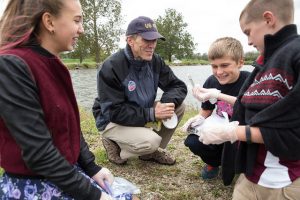Brody Students Engage with EPA on Water Quality

Karl Brooks (center), the regional administrator for the U.S. Environmental Protection Agency, provides a hands-on lesson in water quality for Brody Middle School students.
Friday afternoon at Brody Middle School, some very well-prepared 7th graders culminated their International Baccalaureate unit on water quality with a round table discussion that examined the issue from many perspectives and was led by a pair of guests who are on the front lines of the fight against water pollution.
Karl Brooks, Regional Administrator for the Environmental Protection Agency (EPA) based in Kansas City, and Kevin Baskin from the Iowa Department of Natural Resources, listened to students role-play as various community stakeholders including farmers, government agencies, concerned citizens and research scientists. And they fielded some good questions, too.
Teachers Amy Kissell, Andrea Basche and Judith Pauley had their students ready to explore aspects of the topic ranging from the science of it to the politics. They’ve been testing water samples drawn from Gray’s lake while studying dead zones the size of Connecticut in the Gulf of Mexico. There was so much bandying of terminology like nitrates and hypoxia that it was easy to forget they were talking about manure at certain points. And besides their due diligence about water pollution the students also did their homework about the visiting experts. They politely and articulately grilled Brooks and Baskin about what’s being done to combat water pollution and also delved into the personal background of Brooks in particular.
“You used to be a state legislator in Idaho,” one student noted. “How did that help prepare you to work for the EPA?”
Brooks was clearly impressed.
“Wow, that was a long time ago,” he said. “I grew up in a capital city just like you all are (Boise). I walked right past the statehouse every day to and from school, so it was cool to eventually work there. And I learned that no one person ever has the single right answer to a problem. Solutions are found by people working together.”
Baskin reminded the kids about the origins of the landmark Clean Water Act.
“That arose from the Cuyahoga River in Ohio catching fire in 1969,” he said. “There was so much pollution pouring into it from factories that they couldn’t put it out.” While everyone tried to conjure the image of a burning river Baskin swigged from a small plastic bottle of water.
Both Brooks and Baskin said that much progress has been made in controlling what they termed point-source water pollution, the kind that can even set rivers aflame. “But non-point source,” like what’s caused by runoff from farm pesticides, for instance, “that’s a problem that your generation is going to have to help with,” Brooks told the students.
“Why is clean water controversial?” one girl wanted to know.
“Because solutions to pollution are expensive,” Baskin replied.
Before everyone left for a field trip around the corner and down Fleur Drive to the Des Moines Waterworks, Brooks recalled how he got hooked on environmentalism when he was not much older than his audience.
“When I was 15 I tried to help persuade our state legislators to pass a bottle and can recycling bill,” he said. “The bill didn’t pass but I got hooked on the issues.”
Taking care of natural resources is a duty that citizens have to one another, Brooks pointed out. If the young ones he spoke to Friday hadn’t thought of it in just those terms previously, maybe some of them will now.
Led to water by their teachers they took a good long drink on Friday afternoon.
Photos from Brody’s Water Quality Lesson with the EPA




